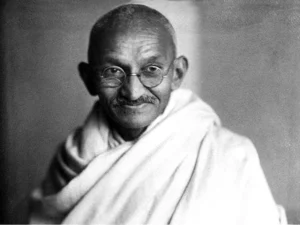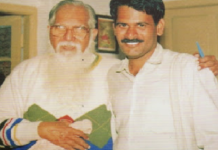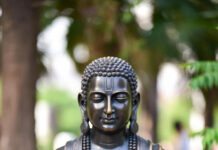
Dear Je,
I was sharing your articles on Gandhism with one of my friends and what he had to say bothered me quite a bit. He said “It was Gandhi, who introduced the culture of prostration in Indian politics. He did not discourage people falling at his feet under the premise that he is a Mahatma. And that culture continues to this date in Indian Politics.” I could not contradict this. What are your views on this?
– Saravanan
Dear Saravanan,
Did Gandhi consider himself a Mahatma? Did he project himself as a Mahatma? These are two different questions.
Gandhi was a man with a modern outlook. Many elements of European Modernism such as practical scientific outlook in everything and refinement were part of his basic character. Europeans, who have met Gandhi, have said that his conduct and behaviour were very much that of a European. Would such a person call himself a Mahatma? This should be our first and foremost question.
Gandhi never claimed himself a Mahatma, nor did he encourage others claiming him as one. He just ignored those who called him so. On the contrary, he wished that he be considered an ordinary person.
One might even argue that this projected humbleness could be due to the fact that he considered himself a Mahatma. Did Gandhi consider himself a sage, or an incarnation of God or a Superman? What was the image that he held about himself? What did Gandhi try to become, throughout his life?
To understand this, we should delve into Gandhi’s tradition and his inner psyche. Gandhi belonged to the Gujarati Vaishnavite sect. Gujarati Vaishnavism acquired its basic tenets from Jainism. Gandhi’s mindset too was a product of the influence of Jainism upon this land for thousands of years.
Jainism would explain all of human greatness through one simple word ‘Bhavyam’, which means simplicity and dedication. This is the ultimate peak that a man should reach. Jainism preaches that only by being simple one can become free from one’s own sins and that would eventually lead to salvation.
The worst enemy that a man needs to conquer is himself. It’s his lust, anger and passion that drag him down and bind him. This ideology of Ajivagam-Jainism is pronounced through the two thousand year old verse – “evil and good are of one’s own making” (from Sangam Literature).
Hence self-restraint (which is referred to ‘as dispelling ills of five senses’ by Tirukkural) has always been the principal path of Jainism. The central tenet of Jainism is that spiritual growth for any individual would occur only by retreating from the world. Abstinence is the main doctrine of Jainism and Vaishnavism inherited this. Gandhi’s childhood shows that his mother imbibed in him the ideas of strict abstinence. Gandhi started practicing abstinence quite early in his life. His preliminary effort in this direction was his intense struggle to be a strict vegetarian in his diet, while he was in London. Just to keep his vows, he even tormented himself by starving. He realized that this kind of self-restraint sharpened his mind. He also felt stronger with his control over his body and mind. This was his beginning.
Though this enlightenment came to Gandhi, who was subconsciously a Jainist-Vaishnavite, he did not move further onto religious spheres. On the contrary, he took to the modern European spiritual thoughts of those days. He acquired those ideas from the books on natural food written by nature therapists and practitioners, which he happened to read while he was in London. This made him discover Thoreau, Ruskin and Tolstoy. This was his journey.
Gandhi entered politics as a man trained in European alternative spirituality. ‘Success through sacrifice’ was the essence of his wisdom. Life in tune with nature, denial of consumerism and self control were his ways and means. The Satyagraha that he formulated from the above ideas was his political path.
These aspects, which later projected him as a Mahatma to others, were rigorously practiced by him, even before he became a public figure. Gandhi’s character and personality had already taken shape while he was in South Africa. He founded and ran the Tolstoy Farm as an experiment to cultivate his character and practice it.
Gandhi has written elaborately about this period. He was tormented by two basic desires, one was sexual desire and the other was food. Coming to realise that he could not master himself unless he overcame these two, he subjugated them through severe vows of self-abnegation. This had been the practice of the Jain saints over centuries. Similar kind of struggle and evolution can be seen in Narayanaguru’s autobiographical verses.
We can guess that the more intense a personality is, the more would be his interest in sex and food, which are basic desires. They would probably be self-centered with a sense of humour.
Only he, who gets rid of these two desires with one’s sense of humour and integrates the scattered bits of his personality through self-focus, becomes an achiever. Extensive and exhaustive study of world history is not needed to realise this. Even to score good marks in High School examinations, one needs control over one’s senses.
When he entered Indian politics, Gandhi had discovered his self through continuous experiments on two planes. One was severe vows to gain self control and the other was following absolute values in public life. He had experimented with these two things objectively in a practical manner and had reaped the benefits.
Even after returning to India, Gandhi was simultaneously involved in these two areas. He established the Sabarmathi Ashram, where he increased his mastery over his Self. His experiments upon his body and mind were elaborate. He keenly observed his body and tried to formulate his own diet and medicines that would suit his body. He tried to implement the simple life in-sync with nature, where all men would live without any sort of discrimination.
With these values he devised a method of protest called Satyagraha and succeeded with it in Champaran. The honesty, the courage and the simplicity of that struggle identified him as a new force, which was non-existent in India until then.
It was at this stage, that Gandhi was looked upon by the Indians as Mahatma. It was the Indian psyche, which has a tradition of thousands of years, that identified him as Mahatma. The experiments he subjected himself to for achieving control over his personality, his vows, the values he put forth in public life and his absolute determination to hold on to those values would easily make him a Jain sage, though his approach was based on the experimental methods of the West.
Those who are aware of Indian history can understand that Gandhi’s struggle was not new to Indians. His was a peaceful protest, which had been practiced by the Jain sages for centuries. One can understand this by considering the importance given in the history of Tamil Nadu to the place of refuge sought by those who were afraid of disrepute – anjinan pukalidam.
The Jain sages would declare a specific piece of land as theirs. Stones with inscriptions of peacock feather and three tiered umbrella would be erected at the corners. No one would be allowed to use weapons within these boundaries. If a person, fearing for life, enters this place seeking refuge, the sages there would become his protectors. His enemy, even an emperor, was not permitted to enter the place and capture him. If the emperor does breach the code and capture him, then as an ultimate protest, all the sages would fast unto death in front of the emperor’s palace. No King existed in India who would take up such bad karma upon himself.
It is not too difficult to understand that a cultural tradition, which was nurtured by the patience, tolerance and sacrifice of these sages in deeply establishing their righteousness, saw Gandhi as its extension and called him a Mahatma.
There is a belief that it was Tagore who first called Gandhi a Mahatma. But, Gonds, the tribes of Madhya Pradesh, were the first to call him Mahatma in the 1920s, when Gandhi came to India and started his service in politics. Gandhi said that it was despicable and condemnable to call him a Mahatma. He did not allow those who called him Mahatma to come near him, but those simple men could not be restrained so easily.
The title Mahatma made him uncomfortable. One can see Gandhi always making a mockery over that word, in all his speeches, in his own subtle way. Gandhi did not like the idea of someone having his portrait. Vincent Sheean, who had stayed with Gandhi, observed him and wrote a wonderful biography, says in his ‘Mahatma Gandhi-A Great Life in Brief’, Gandhi prevailed upon them to throw away his portrait. Gandhi was pained and felt ashamed when he heard someone claiming that he was cured of his disease on seeing Gandhi.
To the question ‘Why are you called Mahatma?’ Gandhi replied, “It terribly pains me. I have nothing new to say to this world. Truth and Ahimsa are as old as the mountains. I can only say that I tried to practice these two in my personal life. But I will always be ready to explain my experiences from those experiments. Through this I gained strength to involve myself in politics. Many people say that they respect me, because I have, more than anyone else, understood them thoroughly”.
Gandhi’s mind was much influenced by Western thoughts. Till the end there was always a place for self mockery in his life. He would heartily laugh after making sarcastic remarks about himself. Vincent Sheean registers that Gandhi laughed cheerfully when a White boy asked him “Hey Gandhi, where is your trouser?”
Yet a whole nation was at his feet. His feet became sore by the touch of people who prostrated before him. Millions of people followed him just by watching him and taking him in rather than by hearing or understanding him. It was not because they understood what he said was right, but because they understood that he was right!
Have you ever wondered about this? In this ancient country, where feudalism had existed for at least twenty centuries, more than three quarters of its land was still under monarchy. In such a country, an individual had brought the entire society into democratic polity in less than fifteen years! Do you know that in Indian history, Gandhi’s Congress is the institution that brought more women into politics than any other movement? When compared to it, women’s participation in the Communist and Dravidian movements is almost negligible.
Hundreds and thousands of people from the middle class, including women went to prison, simply because they trusted Gandhi. These were the very same women who were ostracised for stepping out of the house, which was considered a sin! Many thousands more, who were born and brought up in explicit caste fanaticism, went to live in the villages of the oppressed classes and cleaned their toilets, just obey his words.
Gandhi’s non-cooperation movement was the first people’s movement in India. The Indian society, which existed with a feudalistic mindset, without any politics for thousands of years, was politicised only by this wave. Some aspects of that politics were adopted by the communist party, Dravidian movements and even to some extent by the Muslim League. In his book on Kerala’s freedom movement, EMS Namboodiripad writes about all this.
What made that political uprising? Even in today’s wave of information technology, communication with the whole of India still remains a challenge. In those days the print media was not that prominent. Radio was not yet widespread. Electricity was not available in thousands of Indian villages and hence there was no microphone. How then could Gandhi have spoken to the nation and unite it ideologically?
He made himself the message. A leader has to be extremely courageous to declare that his life was his message. He needs unshakable belief in his straightforwardness to stand before history and proclaim, “I have no secrets” and say, “Examine me!”. He should have unlimited moral strength for this. In a century of Indian politics, no one, except one man, was able to say that. If you are doubtful, try to investigate into the personal life of any leader, in whom you have faith, as was done with Gandhi’s personal life. His soul would scream!
Gandhi carried just himself all over India. In hundreds of railway stations he stood at the entrance of the third class compartment with his lean dark physique attained through his vows. He greeted people with folded hands and a humorous smile in his merciful eyes. This was the message that reached the whole of India. It was this giant wave that united this nation and brought it into socialistic politics. The title Mahatma helped him achieve this.
This country has its own spiritual-logic. It sees God in everything that is identified with greatness. If a dog chases a lion, then the Indian psyche would start worshipping the dog without any hesitation. The tradition, which believed that he who lived an absolute life is God, accepted him as Mahatma and worshipped him. He was sitting with great embarrassment upon that enormous emotional tide.
I would like to ask those who say that Gandhi’s simplicity was a pretense, “what exactly do you refer by modesty?” Every moment of his life is proof to the fact that Gandhi’s modesty was not superficial. Suppression of sensual pleasure was his Yoga. For him, being possessed by the senses meant loss of one’s inner strength. Hence, Gandhi was always renouncing every kind of comfort and luxury.
Personally, I do not agree with Gandhi’s intensity in this. We could see that his modesty had led him to the extent that he rejected arts. Music, painting, dance – all appeared to him as sensual luxuries. This has been the idea of Jain saints for almost two millennia.
Today, some claim that Gandhi’s travel by third class was just propaganda. They fail to observe that Gandhi, after his return to India, had always been travelling throughout India, in the dirty third class alongside common men; that he was the only leader who had closely observed common men and that even Nehru, Patel, Jinnah, Ambedkar and early communists like MN Roy and BC Joshi did not get to know those people as Gandhi did.
After Champaran struggle and the like, Gandhi came to be known as Mahatma. Even after this, he travelled thousands of kilometers by third class. As his face had not yet become popular through the print media, no one could recognize him. We can guess the condition of Indian third class compartment in those days. People lacked basic sense of hygiene and the government never cared for them. Gandhi, during his travels, cleaned the compartments and the toilets himself. He could not help but do this. No one had then bothered to evaluate whether he was a Mahatma or not.
Gandhi kept on renouncing, gave up eating for pleasure, sex and comfortable homes. To him this was progress. His renouncing of comfortable dress was just a stage in that evolution. It was a natural stage of growth for an Indian psyche. Many of us do not notice the fact that even Ambedkar, who was passionate about perfect attire and was identified with it throughout India, started wearing simpler clothes when he became spiritually inclined towards the end of his life.
It is said that Gandhi’s clothes showed him as one among the millions of Indian farmers. When the microphone was not there to give a speech, he just made an appearance before thousands of people who came to see him. His appearance became his message, writes Louis Fisher, who penned Gandhi’s biography, ‘Life of Mahatma Gandhi’.
But that was a Western view. Gandhi’s dress identified him as one of thousands of Indian sages. Was this not the appearance of great sages like Ramakrishna Paramahamsa, Vallalar, Narayanaguru and Ramana Maharishi? Gandhi was not a miracle for the Indian eyes. Numerous men with the spiritual strength that Gandhi had, were living in various parts of India. Some were known to the world and the rest were not. One among them entered politics and that was Gandhi.
A simple Indian rustic psyche would always identify that kind of a man as one who can perform miracles. It worships him as God. Those great men would say over and over again that they should not be worshipped. Yet these people would continue to do so. Only the uninformed would say that the worship was initiated or encouraged by those sages.
Vincent Sheen quotes a comment on Gandhi by Lord Irwin, when he was old. Irwin had said that Gandhi’s extraordinary strength was in his treating everyone as his absolute equal. Not only did he treat very simple persons as his equals, but also men of great stature and power. Butlers, Viceroys and Queens of Empires – all were equals. Never did Gandhi accept or encourage other’s humility. Our Tamil poet had this to say, “We would not look upon great men with awe, and more so will never look down upon the meek”
Have you ever thought about the millions of people who were deeply influenced by Gandhi during his lifetime? Do you know that, in a way, many of them were themselves Mahatmas? Some of them had spoken very few words with him, like Laurie Baker did. Some of them had just seen him in person, like Vaikkom Mohammed Basheer did. And this was just enough to change their entire perspective about life. How many thinkers, writers and artists! From Einstein to Charlie Chaplin, almost all great minds, which lived during his lifetime, were greatly influenced by him.
If you think that a Gujarati Baniya clad in a loin cloth cheated all of them and you, being an intellectual, have realized the ‘truth’, we have nothing to discuss about. You want me to believe that you are a Mahatma or the one who made you believe that, a great Mahatma. Sorry, I have more evidences to believe in Gandhi!
Vincent Sheean says that the greatest difficulty with Gandhi was that he did not know that he was an extraordinary person. He thought of himself as someone with normal intelligence and normal spiritual strength. He thought, if he was capable of doing something, why the rest of them couldn’t. The problem with his upbringing of his children was that he believed they could easily follow his ways. This problem persisted in his Ashrams, especially in relationships between opposite sexes.
Vincent Sheen opines that one can say that Gandhi was not a success in politics. His aim was not getting political freedom for India. His dreams were magnificent. He imagined a world without war and a lifestyle that does not exploit natural resources callously. He imagined humanity with no inequality. He thought that control over the senses and love for neighbours were sufficient enough to realize this goal. He did not realize that these were great challenges for common men. Vincent Sheean thinks that Gandhi’s failures were due to the fact that he was a Mahatma who considered himself a common man. Sheean adds that this can be said of Jesus too.
The title Mahatma was conferred upon him, within a few years after Gandhi’s entry into politics and even before India witnessed his great struggles of sathyagraha. It was affirmed by simple men and great poets like Tagore, Bharathiar, Vallathol and Kuvempu. I do not believe that their words could be ignored by anyone with keen perception. I am really happy that I do not have the ‘genius’ to think that they fooled themselves with pretences and that we have better intuition to know the truth.
I do not refer Gandhi by the term Mahatma. Adding titles to a person makes us prejudiced and it becomes difficult to understand the person in the right perspective. Gandhi chose Karma Yoga, one of the paths of wisdom in the Indian tradition, as his path and thus became a sage. However, we cannot call Gandhi a complete man, a sage or a Paramahamsa with the customary meaning that these titles convey.
Yet, I have no hesitation to dance in celebration with the song of the modern poet of my language Bharatiar, ‘Long live Gandhi Mahatma, you who came to give life to the nation that was in shambles.’
Jeyamohan
From the Tamil book InRaia Gandhi (Gandhi Today)
Translated by Srinivasan












